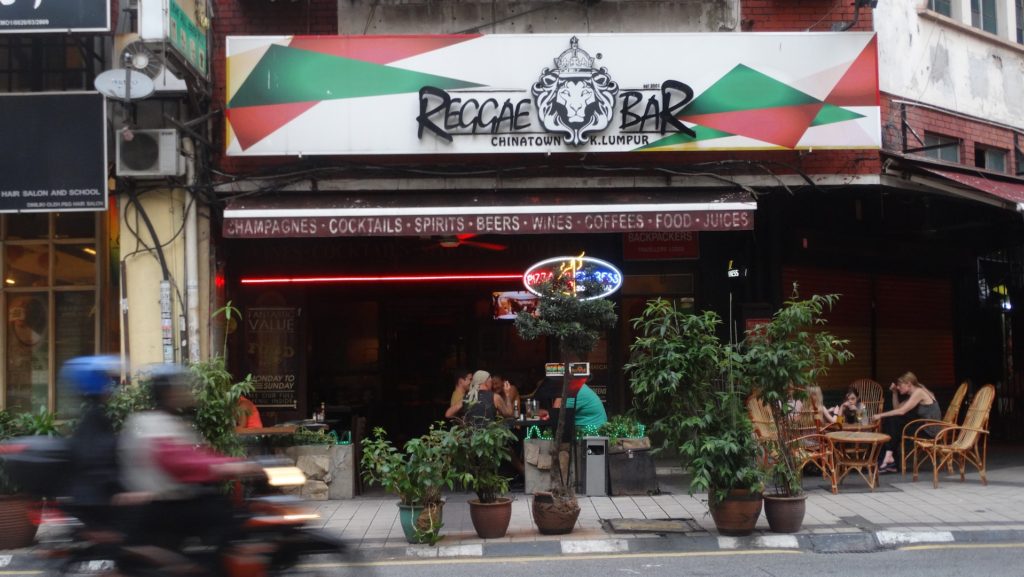A PLAGUE OF REGGAE

I accepted the invitation to the Reggae Bar that evening in Kuala Lumpur. This in mainly because two of the girls were staying in the same dorm as me. And, it’s always good to build rapport with fellow bunk dwellers. This is in case there is the need to explain why you woke them up in the middle of the night to stop them snoring.
The name of the venue gave me all the information I needed to compose a mental sketch of the establishment. It would be dingy and cramped with the walls almost entirely covered in Bob Marley’s features. His expression a mixture of anguish and ecstasy.
A Place for Reggae
An acquaintance once said that listening to reggae always compelled him to look at his watch, as if time was idly evaporating, never to be salvaged. I don’t share his view because I like reggae. Sometimes I really like it, but I can see where he’s coming from. It certainly wouldn’t be first choice in an army tank as it roared into battle, or the soundtrack to a pride of lions chasing a gazelle in a wildlife documentary. But, it’s pretty harmless.
The hostel I was staying at was in the Chinatown district of Kuala Lumpur. The area has become a bit of a hot bed of backpacker activity, i.e. cheap, run down hostels, bars and eateries. And, an enormous market where aggressive stallholders try to coerce you into buying counterfeit tat. There are some bargains available and, when I’m in the mood, haggling – over what would probably be the equivalent to a bowl of noodles at one of the stalls nearby – can be quite fun. There are also a couple of notable temples nearby, namely the Chinese Guan Di and the Hindu Sri Mahamariamman. All of which combines to make it a popular area for visitors who don’t know any better.
In amongst all these attractions/deterrents is the Reggae Bar, and the Reggae Mansion hostel. So, what is it that makes reggae themed venues so appealing to young holiday makers? And, what place do they have in a modern Muslim country in Asia?
Reggae and Rastafarianism
The quintessential sound of Jamaica, reggae emerged on the island in the late 1960’s. Bob Marley brought it to an international audience and his image would later adorn the walls of middle-class students, bongs, t-shirts, and many millions of album covers.
In the 60’s and 70’s Jamaica was breaking free from over 300 years of colonial rule. And, in doing so, trying to manage the political and social upheaval that usually accompanies the path to self self-determination.
As a result, songwriting in reggae reflected both the optimism of a new generation and the raw feelings of injustice. They also did what songs of most genres do at some point. They celebrate love, bemoan unrequited love, mourn lost love and – particularly reggae – eulogise the benefits of getting high. The latter focus was inextricably linked to the following of Rastafarianism. The religion that can be traced to Africa and encourages the ritual inhalation of marijuana.
The faith emerged in Jamaica in the 1930’s after Haile Selassie 1st became king of Ethiopia. Followers believe that he is God and will ensure the return of black people around the world to their African homeland – and improve their standing in society. However, Haile Selassie is a controversial figure. Indeed, observers at the time and since, have condemned his tolerance of the slave trade in Ethiopia and refusal to advance social reform.
In my experience, backpackers generally fall into the early twenties, educated, white, middle class demographic. A far cry from post-colonial struggle and mystical African monotheism. But, it’s only natural that people travelling to exotic, far flung countries on a journey of self-discovery find a home in this culture. After all, it extols the virtues of spiritual exploration and matted, unkempt hair.

A Backpacker Favourite
Yet, what would make staying in a budget hostel called Reggae Mansion preferable to sleeping at the Jazz Cottage or Hip Hop Palace? During the height of his success and pre-election turmoil in Jamaica, Bob Marley turned his own mansion into a ‘safe house’ for locals caught up in the violence. Ironically, this is where assassins made an attempt on his life. I suspect that this link is lost on the guests as they enjoy bbqs and late night parties on the roof top bar.
It is remarkable that a genre of music and its most famous artist have endured in the collective consciousness of travellers, hoteliers and bar owners. This is in spite of hip hop, electronica and rock music all superseding it in popularity. It seems a shame to me that it also overshadows local themes and traditions in hospitality. It leaves us with a predictable and generic model that is repeated, ad nauseam.
I ordered a beer and we sat discussing travel experiences, dating and life in our respective countries. The mental sketch I had drawn up earlier turned out to be pretty accurate. Regardless, I made an internal toast to one of the more prominent pictures of Bob above our table. After all, I like reggae.
-
Lovely photos, remind me of previous visits to far away places in the 50’s. Hope to see Gopro results some time.
Sorry i am not adept at working your web site, but it is very efficient.
2 Comments